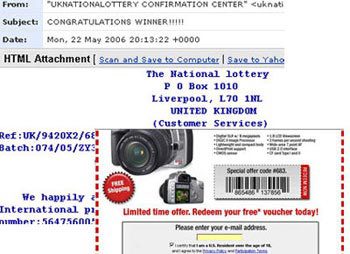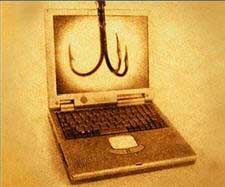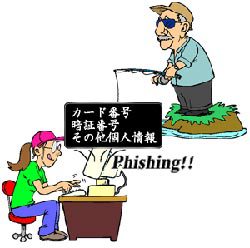Not just strange stories from foreign news websites anymore! Online scams have become increasingly prevalent in the Vietnamese online community. We want to discuss the “scourge of scams via websites and emails” that has been appearing frequently lately!
From foreign scams…
Hoang Viet Tien (Phuong Mai – Hanoi) is a programmer who frequently uses the Internet. He often visits foreign websites and forums to search for information and entertainment. One day, Tien discovered a “sensational” email in his inbox: “Congratulations Winner” (CONGRATULATIONS WINNER!!!!!), in which someone claiming to be a lottery staff member from the UK announced that Tien’s Yahoo email was associated with a specific series of numbers, and in the lottery draw of the lucky numbers from the British lottery, Tien had won £250,000 out of a total prize pool of £1 million. However, they also informed him that he could only claim the prize in the UK if he provided them with complete personal information.
 |
|
A type of lottery scam email. |
Receiving such a large sum of money (£250,000) is enticing for anyone! Almost immediately, Tien replied to the email, and continuously for the next few days, he received emails from the lottery company, from staff to the payment manager and higher-ups. Eventually, a representative stated in an email, “You can choose to claim your prize in person at our headquarters, or through our electronic banking and postal system… “For online banking payments, please send us your bank account number.”
However, the crucial point they made very naturally: Tien had to first send £400 to their international bank account so they could process the online payment to send the money to him. “This fee cannot be deducted from your winnings, so you must send it to our account by… one week!”
Having already suspected the legitimacy of this unexpected money, Tien promptly replied to this email with several requests to verify the information from the lottery company and related details. However, he only received vague information in return and was continually urged… to pay the £400 fee to receive his £250,000 prize!. “At this point, I believe there is a 90% chance this is a scam,” Tien said!
When discussing this issue with several IT experts, we received sympathetic responses and firm confirmations: This is clearly a 100% online scam. One expert asserted: “If you send the £400, you will become a victim of an age-old scam; if not, they will continue to bother you as you foolishly replied to their email.”
There are many similar email scams; a security and information safety expert conducted a small survey on cases of online scams, such as: “You purchased a product from an online store X,Y and won a prize or promotion for a specific amount X, Y..” or simply: “You are the billionth visitor to our website and you have received a gift…”. Most of these scam emails require the recipient to send a sum of money to an international bank account to process the prize. As a result, unsuspecting users often fall into these traps.
 Not long ago, some forums in Vietnam also saw the emergence of “calls for charitable contributions” for victims in the US on the occasion of 9/11 or Hurricane Katrina… The names of these organizations often linked to humanitarian groups from the United Nations… But who knows how your donation will be used when many international media outlets do not mention these organizations (??).
Not long ago, some forums in Vietnam also saw the emergence of “calls for charitable contributions” for victims in the US on the occasion of 9/11 or Hurricane Katrina… The names of these organizations often linked to humanitarian groups from the United Nations… But who knows how your donation will be used when many international media outlets do not mention these organizations (??).
…to domestic “super scammers”!
L.H.A and T.M.T are two webmasters who co-founded a music forum with a significant number of members over two years ago. Since they both programmed and managed the forum, they often exchanged information and resources through Yahoo! Messenger. One day, they were shocked to find that all the resources and database of the forum had been completely stolen and destroyed by an unknown assailant. The hack was less painful than the realization that the perpetrator later revealed himself to be a “super scammer,” teasing them that L.H.A had given him the username and password to access the database system.
“The scammer used a Yahoo nickname identical to that of the second admin and chatted with me. Because I wasn’t paying attention, I couldn’t recognize the Yahoo nickname, which only differed by changing the letter ‘w’ in my friend’s nickname to two ‘v’s. As a result, I comfortably chatted and shared my information and resources with a stranger, thinking it was my close friend,” L.H.A recounted this painful lesson!
The type of scam L.H.A encountered is quite common nowadays; many people regularly active online and have public Yahoo mail accounts have fallen victim to scammers using similar nicknames to deceive their friends through chat. This method is quite simple and quick, with a fake account similar to the real one to impersonate, such as changing phanvanhung45 to phananhung45; nguyenminhvhf to nguyenminhhvf… It can be very hard to detect if you’re not careful!
However, the most frustrating types of scams are still those via email and websites. If they come from abroad, they usually follow the email scam patterns discussed above, and the scams on websites are similar. In Vietnam, such scams from local internet users are becoming increasingly common.
One of the major complaints among internet users is a number of websites and personal forums that specialize in teaching how to hack online games, freely sharing autoplay software, duplicating items, and hacking other people’s accounts… Hundreds of gamers, enticed by immediate gains, have trusted these websites and entered their game account information, only to lose all their in-game assets (items) in large amounts, even losing their entire accounts without knowing whom to turn to…
 Additionally, wrongdoers exploit free domains to create websites with addresses similar to those of online game service providers or banks… sending emails to users stating that their email password or game account has low security. They require you to change it by re-entering your password and secret question information… This type of scam is quite sophisticated and complex; it can lead to email theft, account and item theft in games, or even gaining control over domains, hosting, or bank accounts… very dangerous!
Additionally, wrongdoers exploit free domains to create websites with addresses similar to those of online game service providers or banks… sending emails to users stating that their email password or game account has low security. They require you to change it by re-entering your password and secret question information… This type of scam is quite sophisticated and complex; it can lead to email theft, account and item theft in games, or even gaining control over domains, hosting, or bank accounts… very dangerous!
Users need to be informed!
“Most online scams rely on a very small probability of users being gullible or greedy to succeed. Just imagine if only 0.5% of the 10 million email addresses they spam every day reply,” commented Mr. Trinh Cong Thanh.
For the types of online scams currently present in Vietnam, whether it involves intangible assets (email, online game accounts, domain names, hosting…) or tangible assets and money, victims find it very difficult to obtain compensation and proper redress. Collecting evidence online is extremely challenging, and the laws are not comprehensive. With scams from abroad, the difficulties multiply. “If someone wants to sue abroad, the initial court fees are already around $1,500,” Mr. Thanh noted.
Therefore, users need to be cautious and cannot be indifferent or gullible, and must think carefully whenever they want to click, fill out information, and especially when transferring their money.
The Phong

















































